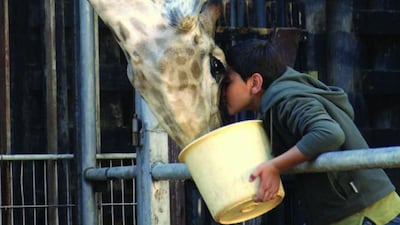To those living outside Palestine, the country tends to conjure images of gun battles, bombed-out buildings and politicians bickering. But the reality of everyday life there isn’t something that has been depicted on the big screen before, which is why the director Rani Massalha was keen to bring his vision to life in Giraffada.
He tells his story through the eyes of a 10-year-old boy, Ziad, growing up in the backdrop of war who finds solace from feeding a pair of giraffes at the zoo where his widowed father works as a vet. The movie was inspired by a giraffe at the zoological gardens of Qalqilya that died after a raid in 2002. The rest of the story is fiction, Massalha admits. “I created this project through the eyes of a child because being a kid is very difficult in Palestine, and I wanted the world to see that. The wall that surrounds the occupied West Bank is nine meters high. I thought, even a giraffe is not as tall as that wall.”
Ziad, played by Ahmed Bayatra, is a cousin of Massalha’s, which he says made it easy for him to be hard on him as he trained him up. “It was much harder to direct the giraffe than the kid. Working on this film was the first time he had ever left his village, and he worked very hard on this film.”
The father is played by the popular Palestinian actor Saleh Bakri, who confessed after the film’s Middle East premiere in Abu Dhabi on Saturday that it was the first time that he’d watched the film himself. “I loved it. I loved the story, and most importantly I believed in the story.”
Bakri’s character is tormented by his son’s sadness over the death of one of the giraffes following an air raid, and he worries that the other giraffe will die of loneliness when she stops eating. He decides that the only way to save the remaining giraffe is by sneaking in a companion for her, with some help from a French journalist (played by Laure de Clermont) and a fellow vet living on the other side of the wall (played by Roschdy Zem).
The film’s seminal point comes when the zoo’s new giraffe wanders freely through the streets of the Palestinian town to his new home, a poignant symbol of hope and humanity in a place full of despair. The giraffe has managed to transcend borders, as those who watch him in awe cannot.
Massalha’s own Palestinian father passed away last year, before he got the chance to see his son’s depictions of his home country on the big screen. But the film will be shown in Palestine in January, and Massalha admits that he’s excited to see what the people there will make of it. “We have shown that it is possible to shoot a film in Palestine, because we shot most of our film there. The only Israelis you see when you are living in Palestine are the soldiers with the guns. I wanted to show another side to this, through the relationship between the Israeli vet and his Palestinian colleague. Usually Israelis are depicted as blond and light-skinned, but the truth is sometimes I can’t tell if people are Jewish or Arab, so I wanted to break the cliché. That’s why I cast Roschdy Zem in the role as the Jewish vet, as he’s an Arab actor. Actually, he’s a very well-known actor, but he did this role for free. We’ve dedicated this film to the Palestinian struggle.”
Follow us @LifeNationalUAE
Follow us on Facebook for discussions, entertainment, reviews, wellness and news.

